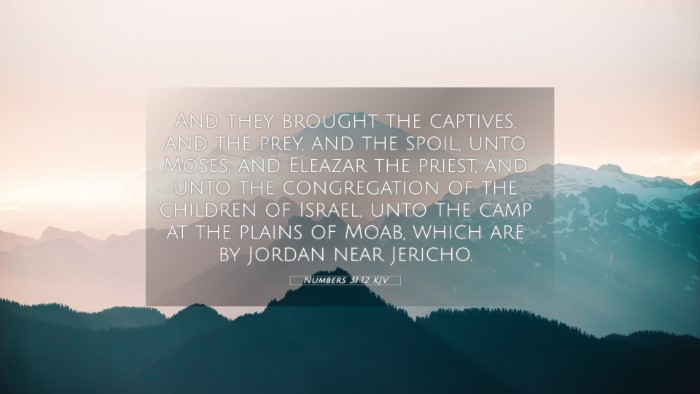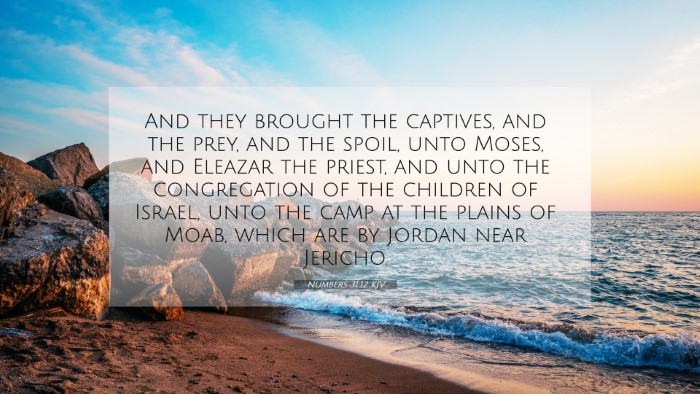Understanding Numbers 31:12
Numbers 31:12 states: "And they brought the captives and the prey and the spoil unto Moses, and Eleazar the priest, and unto the congregation of the children of Israel, unto the camp at the plains of Moab, which are by Jordan near Jericho." This verse presents a significant moment in the narrative of Israel's journey and their interactions with both God and their enemies. Below, we explore interpretations of this verse through insights from public domain commentaries.
Contextual Background
In the context of the Book of Numbers, the Israelites face challenges as they approach the Promised Land. The preceding chapters detail their struggles and victories. Numbers 31 describes the Israelites' battle against the Midianites, a critical moment that exhibits God's command to Israel and their faithful obedience.
Key Themes in Numbers 31:12
- Obedience to God: The actions of the Israelites in this verse reflect their adherence to God’s command to wage war against the Midianites.
- Involvement of Leaders: The mention of both Moses and Eleazar indicates the structured leadership in Israel, emphasizing that spiritual and civil authorities worked in unison.
- Restoration and Preservation: The returning of captives and spoils signifies God's provision and the importance of retribution and preservation of what He has given to Israel.
Insights from Commentaries
Matthew Henry notes that this verse encapsulates a pivotal moment when Israel, having gained victory, is now held accountable for their actions. The collection of spoils is not just military success but also a testament to their faithfulness to God’s orders.
Albert Barnes emphasizes the significance of bringing the captives and spoils back to Moses and Eleazar. This act symbolizes the integration of warfare success into the community’s larger framework and reminds the people of their spiritual and moral obligations.
Adam Clarke draws attention to the implications of captivity and warfare throughout biblical history, noting that these principles would be echoed in later texts as Israel wrestles with concepts of justice and mercy.
Cross References and Thematic Connections
To better understand Numbers 31:12, we can consider the following Bible cross-references:
- Deuteronomy 20:14: God's instructions regarding spoils taken during warfare.
- Joshua 8:2: The command to take spoils from conquered cities, emphasizing continuity in God's directives.
- Judges 5:30: References to spoil in the context of battles, showing how these concepts evolve over time.
- 1 Samuel 15:21: Saul's disobedience regarding the spoils of war highlights Israel's ongoing struggle with divine commands.
- Ephesians 6:12: Although different in context, it connects the spiritual warfare that believers face today.
- Romans 8:31-39: The overarching theme of God's victory for His people resonates with the triumph in Numbers 31.
- Revelation 19:11-16: Imagery of Christ as a warrior king connects with Old Testament themes of God leading his people in battle.
Learning from Numbers 31:12
The significance of Numbers 31:12 stretches beyond mere historical record; it provides valuable lessons for contemporary believers:
- Divine Commandment: Understanding and following God's directives in all aspects of life.
- Community Accountability: Recognizing the importance of leadership and accountability in religious and moral contexts.
- Integration of Success and Responsibility: Acknowledging that victories should be brought to the community’s attention, emphasizing collective responsibility.
Conclusion
In summary, Numbers 31:12 serves as a multifaceted scripture that sheds light on themes of warfare, obedience, community, and accountability. Through the lens of multiple commentaries and cross-references, one can discern the richness inherent in these texts and how they converse with each other throughout the Bible.
Further Exploration
For those interested in diving deeper into the connections between Bible verses, utilizing tools for Bible cross-referencing, such as a Bible concordance or a cross-reference guide, can facilitate a comprehensive understanding of these thematic connections and parallels in scripture.



